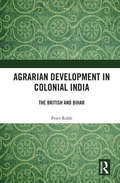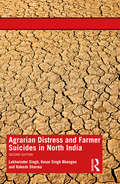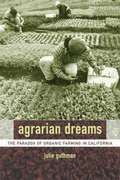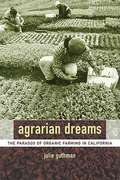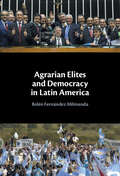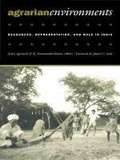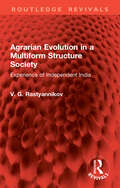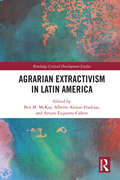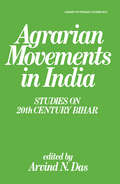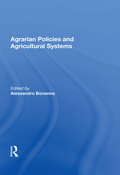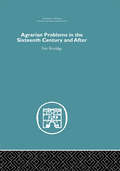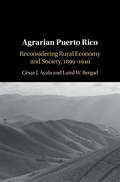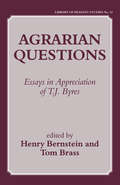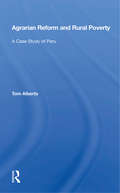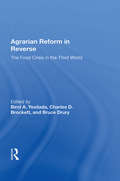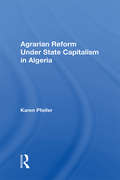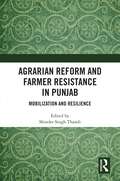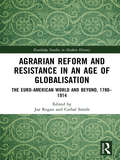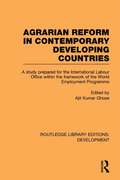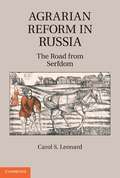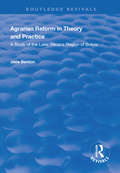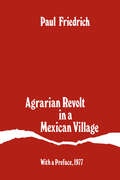- Table View
- List View
Agrarian Development in Colonial India: The British and Bihar
by Peter RobbThis book looks at agriculture, development, poverty and British rule in India, especially in the Patna Division in Bihar between c.1870–1920. It traces the economic influence of British policies and maps the impact of legal, administrative and scientific interventions to rural conditions and norms in the state. The book discusses British theories and policies of ‘improvement’, comparing them with Bihar’s agricultural practice and socio-economic conditions to draw conclusions about rural impoverishment. Following on from his earlier book, Ancient Rights and Future Comfort on the Bengal Tenancy Act of 1885, the author also presents case studies on famines, debts, canal and village irrigation, flood-protection and the cultivation and production of indigo, opium and sugar. He analyses extensive archival material to reflect on property law, scientific interventions, cropping patterns, trade and intermediaries. He examines the economic role of governments, Eurocentric development theories and the complex impact of development policy on agriculture and society in Bihar. The book will be of interest to academics and students of colonial history, modern Indian history, agrarian studies, economic history, sociology, and development studies. It will also be useful to development practitioners and researchers working on the history of agrarian conditions and public policy.
Agrarian Distress and Farmer Suicides in North India
by Rakesh Sharma Lakhwinder Singh Kesar Singh BhangooAgrarian distress in the era of globalization has manifested in the suicides of farmers and agricultural labourers. This book, using empirical research and field data from north India, especially Punjab, examines the different facets of this tragic phenomenon in rural India. Situating Indian agriculture in the context of globalization it looks at the underlying causes of farmer suicides in a state that was the model of modern capitalist agriculture and development. It also attempts to understand why other farmers have chosen not to take the same path. With a comparative framework and coverage of nearly 1400 rural households, it brings out the brutal manifestation of this complex and multidimensional situation in the Indian countryside. Topical, comprehensive and rich in data, this book will be valuable to scholars and researchers of political economy, agricultural economics, South Asian politics, political sociology, and public policy.
Agrarian Distress and Farmer Suicides in North India (Second Edition)
by Rakesh Sharma Lakhwinder Singh Kesar Singh BhangooThis volume provides a comprehensive and detailed socio-economic overview of agrarian distress in India which has manifested in the suicides of farmers and agricultural labourers. Using empirical research and field data from rural India, especially Punjab, this book examines the underlying causes of farmer suicide and steps which can mitigate the crisis. Covering nearly 1400 rural households, the research in this volume identifies the various dimensions of the deepening crisis in agriculture and farming. It categorises the factors of the problem across different regions and estimates its extent and magnitude. The authors, in this updated edition, focus on instances of political mobilization and collective movements by farmers struggling to bring the issue of agrarian distress to attention. The book also discusses the implementation of state-waivered loans and compensations and their effect on the farming community. Topical, comprehensive and rich in data, this book will be valuable to scholars and researchers of political economy, agricultural economics, South Asian politics, political sociology, and public policy.
Agrarian Dreams
by Julie GuthmanIn this groundbreaking study of organic farming, Julie Guthman challenges accepted wisdom about organic food and agriculture in the Golden State. Many continue to believe that small-scale organic farming is the answer to our environmental and health problems, but Guthman refutes popular portrayals that pit "small organic" against "big organic" and offers an alternative analysis that underscores the limits of an organic label as a pathway to transforming agriculture. This second edition includes a thorough investigation of the federal organic program, a discussion of how the certification arena has continued to grow and change since its implementation, and an up-to-date guide to the structure of the organic farming sector. Agrarian Dreams delivers an indispensable examination of organic farming in California and will appeal to readers in a variety of areas, including food studies, agriculture, environmental studies, anthropology, sociology, geography, and history.
Agrarian Dreams: The Paradox of Organic Farming in California
by Julie GuthmanIn this comprehensive study of organic farming in California, Julie Guthman casts doubt on the current wisdom about organic food and agriculture, at least as it has evolved in the Golden State. Refuting popular portrayals of organic agriculture as a small-scale family farm endeavor in opposition to "industrial" agriculture, Guthman explains how organic farming has replicated what it set out to oppose.
Agrarian Dreams: The Paradox of Organic Farming in California
by Julie GuthmanIn an era of escalating food politics, many believe organic farming to be the agrarian answer. In this first comprehensive study of organic farming in California, Julie Guthman casts doubt on the current wisdom about organic food and agriculture, at least as it has evolved in the Golden State. Refuting popular portrayals of organic agriculture as a small-scale family farm endeavor in opposition to "industrial" agriculture, Guthman explains how organic farming has replicated what it set out to oppose.
Agrarian Elites and Democracy in Latin America
by Belén Fernández MilmandaThis groundbreaking book delves into the underexplored realm of agrarian elites and their relationship to democracy in Latin America. With a fresh perspective and new theory, it examines the strategies these elites use to gain an advantage in the democratic system. The book provides a detailed examination of when and how agrarian elites participate in the electoral arena to protect their interests, including a novel non-partisan electoral strategy. By providing a deeper understanding of how democratic institutions can be used to protect economic interests, this book adds to the ongoing debate on the relationship between economic elites, democracy, and redistribution. Agrarian Elites and Democracy in Latin America is a must-read for anyone interested in politics, democracy, inequality, and economic power in the Global South.
Agrarian Environments: Resources, Representations, and Rule in India
by David Gilmartin K. Sivaramakrishnan Margaret Mckean Arun Agrawal Peter VandergeestAgrarian Environments questions the dichotomies that have structured earlier analyses of environmental processes in India and offers a new way of looking at the relationship between agrarian transformation and environmental change. The contributors claim that attempts to explain environmental conflicts in terms of the local versus the global, indigenous versus outsiders, women versus men, or the community versus the market or state obscure vital dynamics of mobilization and organization that critically influence thought and policy. Editors Arun Agrawal and K. Sivaramakrishnan claim that rural social change in India cannot be understood without exploring how environmental changes articulate major aspects of agrarian transformations--technological, cultural, and political--in the last two centuries. In order to examine these issues, they have reached beyond the confines of single disciplinary allegiances or methodological loyalties to bring together anthropologists, historians, political scientists, geographers, and environmental scientists who are significantly informed by interdisciplinary research. Drawing on extensive field and archival research, the contributors demonstrate the powerful political implications of blurring the boundaries between dichotomous cultural representations, combine conceptual analyses with specific case studies, and look at why competing powers chose to emphasize particular representations of land use or social relations. By providing a more textured analysis of how categories emerge and change, this work offers the possibility of creating crucial alliances across populations that have historically been assumed to lack mutual goals. Agrarian Environments will be valuable to those in political science, Asian studies, and environmental studies.Contributors. Arun Agrawal, Mark Baker, Molly Chattopadhyaya, Vinay Gidwani, Sumit Guha, Shubhra Gururani, Cecile Jackson, David Ludden, Haripriya Rangan, Paul Robbins, Vasant Saberwal, James C. Scott, K. Sivaramakrishnan, Ajay Skaria, Jennifer Springer, Darren Zook
Agrarian Evolution in a Multiform Structure Society: Experience of Independent India (Routledge Revivals)
by V. G. RastyannikovIndia in the 1950s and 1960s, with its diversity of economic structures and different levels of regional development, offers a unique opportunity to explore a wide range of agrarian evolution within a multiform society. Basing his study on an extensive survey of the existing literature as well as on fieldwork conducted in India, the author analyses in his book Agrarian Evolution in a Multiform Structure Society (first published in English in 1981) the roots of the Indian society and suggests future directions. He argues that India, like many Asian countries, exhibits tendencies peculiar to an economy evolving on the basis of dependent capitalist development.The author goes on to show how the state, in seeking to ease the teething problems of development, has assumed a decisive role, expressed in terms of the nationalisation of certain sectors of private exploitative property, and in the supersession of private interests by public ones. The historically inevitable progress of Indian society is therefore a paradoxical one: because its economy exists on the periphery of its system-moulding structure—world capitalism—it has special problems reconciled only by state intervention, this in turn makes the development of a capitalist society impossible. The result is a unique study of a society which has assumed increasing importance in world affairs.
Agrarian Extractivism in Latin America (Routledge Critical Development Studies)
by Ben M. McKay; Alberto Alonso-Fradejas; Arturo Ezquerro-CañeteAmid the growing calls for a turn towards sustainable agriculture, this book puts forth and discusses the concept of agrarian extractivism to help us identify and expose the predatory extractivist features of dominant agricultural development models. The concept goes beyond the more apparent features of monocultures and raw material exports to examine the inherent logic and underlying workings of a model based on the appropriation of an ever-growing range of commodified and non-commodified human and non-human nature in an extractivist fashion. Such a process erodes the autonomy of resourcedependent working people, dispossesses the rural poor, exhausts and expropriates nature, and concentrates value in a few hands as a result of the unquenchable drive for profit by big business. In many instances, such extractivist dynamics are subsidized and/or directly supported by the state, while also dependent on the unpaid, productive, and reproductive labour of women, children, and elders, exacerbating unequal class, gender, and generational relations. Rather than a one-size-fits-all definition of agrarian extractivism, this collection points to the diversity of extractivist features of corporate-led, external-input-dependent plantation agriculture across distinct socio-ecological formations in Latin America. This timely challenge to the destructive dominant models of agricultural development will interest scholars, activists, researchers, and students from across the fields of critical development studies, rural studies, environmental and sustainability studies, and Latin American studies, among others.
Agrarian Justice
by Thomas PaineThomas Paine (1737-1809) was an author, pamphleteer, radical, inventor, intellectual, revolutionary, and one of the Founding Fathers of the United States. He has been called "a corsetmaker by trade, a journalist by profession, and a propagandist by inclination." Born in Thetford, in the English county of Norfolk, Paine emigrated to the British American colonies in 1774 in time to participate in the American Revolution. His principal contributions were the powerful, widely read pamphlet "Common Sense" (1776), advocating colonial America's independence from Great Britain, and "The American Crisis" (1776-1783), a pro-revolutionary pamphlet series. Paine was also deeply involved in the early stages of the French Revolution. He wrote the "Rights of Man" (1791), in part a defence of the French Revolution against its critics, in particular the British statesman Edmund Burke. Despite not speaking French, he was elected to the French National Convention in 1792. The Girondists regarded him as an ally, so, the Montagnards, especially Robespierre, regarded him as an enemy. In December of 1793, he was arrested and imprisoned in Paris, then released in 1794. He became notorious because of "The Age of Reason" (1793-94), his book advocating deism, promoting reason and freethinking, and arguing against institutionalized religion and Christian doctrines. He also wrote the pamphlet "Agrarian Justice" (1795), discussing the origins of property, and introduced the concept of a guaranteed minimum income.
Agrarian Movements in India: Studies on 20th Century Bihar
by Arvind N. DasFirst published in 1982. Routledge is an imprint of Taylor & Francis, an informa company.
Agrarian Policies And Agricultural Systems
by Alessandro BonannoThis book is a comparative analysis of the agrarian policies and the agricultural systems of the European Community (EC) and the United States (US). It provides an overview of the agricultural policies of the EC and US, their stated objectives, and their impact on both agricultural sectors.
Agrarian Problems in the Sixteenth Century and After
by Eric KerridgePresenting a full and precise description of all legal ties between landlord and tenant in early modern England, Agrarian Problems in the Sixteenth Century and After re-examines one of the key issues in English agrarian history - the question of the legal security of the copyholder. Comparing historical records and literary evidence, Agrarian Problems in the Sixteenth Century and After reprints much of the important 1969 edition of the book, and asserts that: * customary tenants enjoyed legal security in and before the sixteenth century * enclosures proceeded legally, without oppression, and in much the same form (whether ratified in parliament or not) throughout the whole period * depopulation was less extensive than sometimes supposed and that such depopulation as there was often proved economically profitable and not without social benefit. When first published in 1969, this fascinating book represented a unique viewpoint that affected, and in some cases reversed, much accepted opinion. As a landmark work in a highly important area of English agrarian history, it still has considerable impact today.
Agrarian Puerto Rico: Reconsidering Rural Economy and Society, 1899–1940
by Laird W. Bergad César J. AyalaFundamental tenets of colonial historiography are challenged by showing that US capital investment into this colony did not lead to the disappearance of the small farmer. Contrary to well-established narratives, quantitative data show that the increasing integration of rural producers within the US market led to differential outcomes, depending on pre-existing land tenure structures, capital requirements to initiate production, and demographics. These new data suggest that the colonial economy was not polarized into landless Puerto Rican rural workers on one side and corporate US capitalists on the other. The persistence of Puerto Rican small farmers in some regions and the expansion of local property ownership and production disprove this socioeconomic model. Other aspects of extant Puerto Rican historiography are confronted in order to make room for thorough analyses and new conclusions on the economy of colonial Puerto Rico during the early twentieth century.
Agrarian Questions: Essays in Appreciation of T. J. Byres
by Tom Brass Henry BernsteinThis collection celebrates T.J. Byres' seminal contributions to the political economy of the agrarian question. Uniting the various themes is the demonstration of the continuing relevance of a critical, historical and comparative materialist analysis of agrarian question.
Agrarian Reform And Rural Poverty: A Case Study Of Peru
by Tom AlbertsBased on extensive data for land ownership, income distribution, and agricultural production, this book assesses Peru's experience with development planning since 1950 and discusses efforts to improve the standard of living of its rural population through changes in agrarian structure. .
Agrarian Reform In Reverse: The Food Crisis In The Third World
by Charles D. Brockett Birol A. Yesilada Bruce DruryThis book focuses on the political-economic dimensions of the food crisis, with case studies from the four regions—Africa, Asia, Latin America, and the Middle East—of the Third World. It examines various international factors that influence agricultural development in the Third World.
Agrarian Reform Under State Capitalism In Algeria
by Karen PfeiferThis book examines Algeria's development program through the prism of the agrarian transformation of the 1970s. It provides some insight into the nature of Algeria's social formation today, and into a developmental process common to many Third World countries.
Agrarian Reform and Farmer Resistance in Punjab: Mobilization and Resilience
by Shinder Singh ThandiThis book examines the different dimensions of farmer agitations in Punjab, India. It situates the 2020–2021 farmer resistance movement within the wider context of India’s post-independent development trajectory and provides a thorough analysis of various aspects of the farmers' movement in India. The volume contextualizes Punjab’s history of farmer resistance, organization and mobilization strategies, the globalization of the movement, ways of both sustaining the movement and building resilience. While providing a critical understanding of the three farm laws introduced in India in 2020, the book looks at how they may impact farm operations and livelihoods in the post-Green Revolution period and evaluates strategies of inclusive mobilization for gathering support and sustaining the movement both within India and abroad, with special focus on the role of the Sikh diaspora. Essays in this volume also discuss the participation of women in the struggle and how their experience has the potential to transform gender relations both at home and in the public sphere. Integrated, comprehensive, and concisely written by well-known experts, this book will be of interest to those involved with Punjab’s social, political, and economic history, and students and researchers of food and agriculture in developing countries, peasant and social movements, Indian federalism and role of diasporas as non-state actors.
Agrarian Reform and Resistance in an Age of Globalisation: The Euro-American World and Beyond, 1780-1914 (Routledge Studies in Modern History)
by Joe Regan Cathal SmithThis book investigates the causes and effects of modernisation in rural regions of Britain and Ireland, continental Europe, the Americas, and Australasia between 1780 and 1914. In this period, the transformation of the world economy associated with the Industrial Revolution fuelled dramatic changes in the international countryside, as landowning elites, agricultural workers, and states adapted to the consequences of globalisation in a variety of ways. The chapters in this volume illustrate similarities, differences, and connections between the resulting manifestations of agrarian reform and resistance that spread throughout the Euro-American world and beyond during the long nineteenth century.
Agrarian Reform in Contemporary Developing Countries: A Study Prepared for the International Labour Office within the Framework of the World Employment Programme (Routledge Library Editions: Development)
by Ajit Kumar GhoseInitially published in 1983, in association with the International Labour Organisation (ILO), this book is about the meaning, relevance and process of agrarian reform in contemporary developing countries. It includes seven detailed case studies – one each on Ethiopia, Peru, Chile, Nicaragua, Iran, Kerala, (India) and West Bengal (India). In all the cases, serious contemporary efforts were made to implement agrarian reform programmes and the case studies focus upon selected aspects of this reform process – origins, basic characteristics, problems of implementation and immediate consequences. Each region differs considerably in terms of socio-economic and administrative conditions, but when the reform efforts are placed in their respective historical contexts, several common themes emerge which are dealt with in detail. In all cases, it is clear that agrarian reform is essentially a political process, requiring major social movements and that piecemeal reforms will not solve the grave problems of growth, distribution and poverty in the Third World.
Agrarian Reform in Russia
by Carol S. LeonardThis book examines the history of reforms and major state interventions affecting Russian agriculture: the abolition of serfdom in 1861, the Stolypin reforms, the NEP, the Collectivization, Khrushchev reforms, and finally farm enterprise privatization in the early 1990s. It shows a pattern emerging from a political imperative in imperial, Soviet, and post-Soviet regimes, and it describes how these reforms were justified in the name of the national interest during severe crises – rapid inflation, military defeat, mass strikes, rural unrest, and/or political turmoil. It looks at the consequences of adversity in the economic environment for rural behavior after reform and at long-run trends. It has chapters on property rights, rural organization, and technological change. It provides a new database for measuring agricultural productivity from 1861 to 1913 and updates these estimates to the present. This book is a study of the policies aimed at reorganizing rural production and their effectiveness in transforming institutions.
Agrarian Reform in Theory and Practice: A Study of the Lake Titicaca Region of Bolivia (Routledge Revivals)
by Jane BentonPublished in 1999. Despite the attempts of a number of Latin American republics to redistribute land resources and carry out agrarian reform programmes, ’the land question’ remains a vital political issue throughout the region. This book focuses on Bolivia, where government proposals to replace a radical agrarian reform law of 1953 with a neo-liberal Ley INRA provoked heated public debate and violent campesino clashes with the police (witnessed by the author) in September/October 1996. The first five chapters are largely concerned with theoretical aspects and a review of Bolivia’s agrarian reform legislation: the remaining six chapters are devoted to an analysis, from the viewpoints of participant campesinos and the researcher, of agricultural change in Aymara communities beside Lake Titicaca, where the author has conducted research over nearly 30 years. Currently lakeside farming is under severe threat as a result of land degradation, limited cash resources, rural-urban migration, tourism and commuterisation.
Agrarian Revolt in a Mexican Village
by Paul FriedrichAgrarian Revolt in a Mexican Village deals with a Taráscan Indian village in southwestern Mexico which, between 1920 and 1926, played a precedent-setting role in agrarian reform. As he describes forty years in the history of this small pueblo, Paul Friedrich raises general questions about local politics and agrarian reform that are basic to our understanding of radical change in peasant societies around the world. Of particular interest is his detailed study of the colorful, violent, and psychologically complex leader, Primo Tapia, whose biography bears on the theoretical issues of the "political middleman" and the relation between individual motivation and socioeconomic change. Friedrich's evidence includes massive interviewing, personal letters, observations as an anthropological participant (e. g. , in fiesta ritual), analysis of the politics and other village culture during 1955-56, comparison with other Taráscan villages, historical and prehistoric background materials, and research in legal and government agrarian archives.
